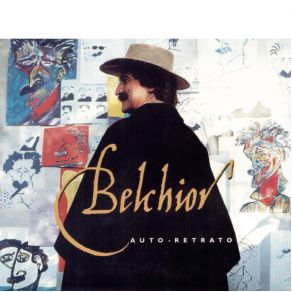Auto Retrato
Download links and information about Auto Retrato by Belchior. This album was released in 1999 and it belongs to World Music, Latin genres. It contains 25 tracks with total duration of 01:44:11 minutes.

|
|
|---|---|
| Artist: | Belchior |
| Release date: | 1999 |
| Genre: | World Music, Latin |
| Tracks: | 25 |
| Duration: | 01:44:11 |
| Buy it NOW at: | |
| Buy on iTunes $16.99 | |
| Buy on Amazon $16.99 | |
| Buy on Songswave €1.64 | |
| Buy on Songswave €1.89 | |
Tracks
[Edit]| No. | Title | Length |
|---|---|---|
| 1. | Brasileiramente Linda | 3:25 |
| 2. | Apenas Um Rapaz Latino Americano | 5:13 |
| 3. | Fotográfia 3X4 | 4:23 |
| 4. | Bahiuno | 5:41 |
| 5. | Pequeno Perfil de Um Cidadão Comum | 4:13 |
| 6. | Balada de Madame Frigidaire | 5:32 |
| 7. | Todo Sujo de Baton | 2:46 |
| 8. | De Primeira Grandeza | 4:32 |
| 9. | Medo de Avião | 2:11 |
| 10. | Paralelas | 4:21 |
| 11. | Divina Comédia Humana | 3:49 |
| 12. | Beijo Molhado | 4:11 |
| 13. | Coração Selvagem | 5:21 |
| 14. | Alucinação | 4:49 |
| 15. | Na Hora Do Almoço | 4:03 |
| 16. | Como Nossos Pais | 5:32 |
| 17. | Pequeno Mapa Do Tempo | 4:21 |
| 18. | Monólogo Das Grandezas Do Brasil | 3:20 |
| 19. | Mucuripe | 3:12 |
| 20. | Ipê | 5:58 |
| 21. | Galos, Noites e Quintais | 3:07 |
| 22. | A Palo Seco | 4:03 |
| 23. | Comentário a Respeito de John | 2:54 |
| 24. | Velha Roupa Colorida | 3:03 |
| 25. | 1992 (Quinhentos Anos de Que?) | 4:11 |
Details
[Edit]Belchior always was at the margin of MPB. In 1976, Elis Regina recorded his "Como Nossos Pais" (as translated in English: "And now I know that the one who gave me the idea of a new conscience and youth/is at home, kept by God accounting his coins") and "Velha Roupa Colorida" (as translated: "What was youthful and new now is old") — projecting him to fame and success. It didn't have the effect of watering down his social criticism. "Apenas Um Rapaz Latino-Americano" censures the excessive ingenuity of Caetano Veloso — the lyrics talk about a certain "antigo compositor baiano" (old Bahian composer): "But I know that nothing is divine/nothing is marvelous."
In this double album, after one decade of releasing his records through independent labels (some owned by him), he returns to the mainstream market through BMG. It has a price, tough. Consisting exclusively of previously released material and his biggest hits up to the total of 25 tracks, the conception is "modernizing." Drum'n'bass, scratches, funk guitars, even if tastefully and musically operated, don't hide the commercial intentions, even if they can be plausible — to present his visceral poetry to newer generations. Other novelties are the orchestral arrangements by Ruriá Duprat (nephew of the conductor Rogério Duprat, who had a prominent role during Tropicália) and André Abujamra.
The album doesn't have the aggressive urge of those in the '70s, which were really a call to arms. But it remains as a document of Belchior's important and expressive contribution, and — as he wanted — is more palatable to newer audiences. The worst is that "Mucuripe" — a fundamental song in his career and in Fagner's — continues to be credited as having being written by both, when today is known that its true writer was Henrique Voegeler, some 70 years ago.